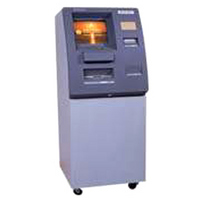 This is true, but misses the point:
This is true, but misses the point:
If ordinary bank ATMs can be made secure and reliable, why can’t electronic voting machines? It’s a simple enough question, but, sadly, the answer isn’t so simple. Secure voting is a much more complex technical problem than electronic banking, not least because a democratic election’s dual requirements for ballot secrecy and transparent auditability are often in tension with one another in the computerized environment. Making ATMs robust and resistant to thieves is easy by comparison.Yes, and Lyndon Johnson stole a Senate race by ballot box stuffing back in the days of all-paper ballots.— ATMs can fail, too: It isn’t just voting machines. Matt Blaze, Exhaustive Search, 23 May 2008
But that doesn’t change the simple fact that it’s far easier to fiddle results with paperless electronic machines than it was with paper ballots. Or that an ATM failure tends to be very localized and limited, while voting machines can be hacked in bulk. Or that the results of a failed election can be an unnecessary war, more than 4,000 U.S. dead, a million others dead, quadrupled gas prices, $40+ trillion in debt, peak oil without deployment of solar and wind, environmental crisis near or beyond tipping point, and need I go on? At what level of demonstrated risk does it become obvious that waiting for perfect voting machines isn’t the right answer?
Fortunately, some states have gotten the point already.
-jsq
NICE!
I would also offer that, IMLE, Banks tend to attract better resources for securing these sorts of things than the Gov’t does.
Yes, but you say the author missing the point, what point does he miss? This implies you think there’s a problem with his conclusions. He says electronic voting is hard for the same reasons you talk about.
If you read the whole post and some of the other things on his web site, it appears that he has actually looked at the technology in question in depth and agrees that paperless evoting is a problem.
Blaze is a professor at my university and I heard him give a very interesting talk on voting technology earlier this year. I’m curious about what if anything you actually disagree with him about or what you think he’s missing, since I believe he’s quite influential in this area and his talk seemed spot on at the time.
Alan, yes I know Matt Blaze, and if you glance back a bit in my blogs, you’ll find I’ve cited his work regarding CALEA and VoIP:
http://riskman.typepad.com/perilocity/2006/06/voip_calea_cons.html
and the Protect America Act:
http://riskman.typepad.com/peerflow/2008/02/centralized-bac.html
Not only that, I like his lockpick work.
However, unless he’s changed his position that “we can’t exactly stop holding elections until the technology is ready” I continue to disagree with him on that point:
http://riskman.typepad.com/perilocity/2007/08/count-em-all-by.html
India builds and uses an electronic voting machine that’s much more secure than the ones in use in the U.S. Not to mention, we already know how to use paper ballots, or combinations of paper and scanners, as Florida does (follow the link at the end of my post). So Matt’s post about ATMs is, as I said, true, but misses the point. The point being that we need to do something about easily subvertible electronic voting now, not later. It’s irrelevant that making electronic voting secure is hard. We know how to vote without using electronic voting machines, and we need to get on with it.
John,
OK, thanks. I’m surprised though, because I either misunderstand your or his position, which I’d think would agree (and I thought agreed with my own). He’s hardly a defender of e-voting as far as I can tell from the talk I heard, and I’m not sure why you think otherwise. I don’t know for sure. I’m just IT staff (in a different school even), so maybe you know more about this than me.
Anyway, certainly the talk I heard him give was very critical of e-voting.
Alan